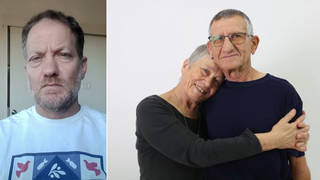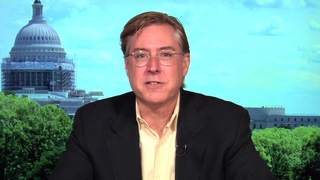
Guests
- Gregory MeeksDemocrat of New York and chair of the Congressional Black Caucus political action committee, which has endorsed Hillary Clinton.
- Jeffrey Sachsleading economist and the director of The Earth Institute at Columbia University. He’s the author of many books, including, most recently, The Age of Sustainable Development. His recent article for The Huffington Post is titled “Hillary is the Candidate of the War Machine.”
Democratic presidential candidates Vermont Senator Bernie Sanders and former Secretary of State Hillary Clinton faced off Thursday night in the first Democratic debate since Sanders’ decisive victory over Clinton in Tuesday’s New Hampshire primary and drew sharp distinctions between each other on everything from foreign policy to how they plan to pay for the programs they’ve proposed, to campaign finance reform. Our two guests respond. Reacting to Clinton’s claim she helped negotiate a ceasefire in Syria, Jeffrey Sachs argues, “She has backed a CIA-led attempt at regime change that has led to a bloodbath there.” Sachs is a leading economist and the director of The Earth Institute at Columbia University, whose recent article for The Huffington Post is headlined “Hillary is the Candidate of the War Machine.” He adds that, domestically, Clinton “is basically saying the status quo is just fine.” But New York Congressmember Gregory Meeks, chair of the Congressional Black Caucus political action committee, which has just endorsed Hillary Clinton, says Sanders has promised change that he will be unable to deliver. “If you’re running on just a dream, and not how you can do something in reality, then I think that is misleading the American people,” Meeks says.
Transcript
AMY GOODMAN: In the first Democratic debate since Vermont Senator Bernie Sanders’ decisive victory over former Secretary of State Hillary Clinton in Tuesday’s New Hampshire primary, the two candidates faced off in Milwaukee, Wisconsin. Sanders and Clinton drew sharp distinctions between them on everything from foreign policy to how they plan to pay for the programs they’ve proposed, to campaign finance reform.
SEN. BERNIE SANDERS: Secretary Clinton’s super PAC, as I understand it, received $25 million last reporting period, $15 million from Wall Street. Our average contribution is $27. I’m very proud of that.
HILLARY CLINTON: I would just say, I debated then-Senator Obama numerous times on stages like this, and he was the recipient of the largest number of Wall Street donations of anybody running on the Democratic side ever. Now, when it mattered, he stood up and took on Wall Street. He pushed through and he passed the Dodd-Frank regulation, the toughest regulations since the 1930s. So, let’s not in any way imply here that either President Obama or myself would in any way not take on any vested interest, whether it’s Wall Street or drug companies or insurance companies or, frankly, the gun lobby, to stand up to do what’s best for the American people.
SEN. BERNIE SANDERS: OK, let’s not—but let’s not—let’s not insult—let’s not insult the intelligence of the American people. People aren’t dumb. Why in God’s name does Wall Street make huge campaign contributions? I guess, just for the fun of it. They want to throw money around. Why does the pharmaceutical industry make huge campaign contributions? Any connection maybe to the fact that our people pay the highest prices in the world for prescription drugs? Why does the fossil fuel industry pay—spend huge amounts of money on campaign contributions? Any connection to the fact that not one Republican candidate for president thinks and agrees with the scientific community that climate change is real and that we have got to transform our energy system?
And when we talk about Wall Street, let’s talk about Wall Street. I voted for Dodd-Frank, got an important amendment in it. My view, it doesn’t go anywhere near far enough. But when we talk about Wall Street, you have: Wall Street and major banks have paid $200 billion in fines since the great crash; no Wall Street executive has been prosecuted.
AMY GOODMAN: For more on Thursday’s debate and the overall Democratic race, we’re joined by two guests. Joining us from Capitol Hill, New York Congressman Gregory Meeks, chair of the Congressional Black Caucus political action committee, which has just endorsed Hillary Clinton. And here in New York, Jeffrey Sachs is with us, leading economist, director of The Earth Institute at Columbia University, author of many books, most recently, The Age of Sustainable Development. His recent article for The Huffington Post is headlined “Hillary is the Candidate of the War Machine.”
We welcome you both to Democracy Now! Congressman Meeks, let’s begin with you. Can you talk about the significance of the endorsement of the Congressional Black Caucus’s political action committee?
REP. GREGORY MEEKS: Well, it is—as we believe the campaign is now really starting, as we move into states that are more reflective of America, it is important and significant that we’ve had two senators. I mean, when she was a senator here in the United States Senate, Bernie, who had worked with—both on the House and on the Senate side, who has been a partner for, particularly, Democrats in getting Democrats elected, so that we could have majorities in the House and in the Senate, because whoever is the president—you know, President Obama has substantial obstacles because no longer, after the first two years, did he have any Democrats. The person that has been a partner to get Democrats elected to the House and to the Senate, the person who has worked to make sure that there is a difference in the country and has partnered with the CBC PAC has been Hillary Clinton. And we think that it’s important to get that message out, so that individuals know what has taken place. And that is why we endorsed Senator Clinton yesterday, or Secretary Clinton.
AMY GOODMAN: You’re very critical, Professor Jeffrey Sachs, of Hillary Clinton. You say—the headline of your Huffington Post piece, “Hillary is the Candidate of the War Machine.” Your response?
JEFFREY SACHS: I think last night’s debate was really a terrific debate, because it did clarify many different things. It also confused a few things, when Hillary Clinton, for example, said that she negotiated the 2012 ceasefire. There was no ceasefire in Syria. She was the reason why the ceasefire never took place then, because she has backed a CIA-led attempt at regime change that has led to a bloodbath there. That’s what I wrote about a few days ago.
And also, on the domestic side, she basically said, “I will change nothing.” And that, I think, is really sobering for those of us who believe in a progressive agenda. She said, “Don’t dream. We can’t do it. Don’t go with this guy. He can’t make these changes.” And that’s very sad, actually, to just be campaigning on the grounds, “No, we can’t.” I think the fact of the matter is, we could accomplish a great deal. And she’s basically saying that the status quo is just fine.
When she said that the bankers were still—had no influence in the Obama administration, it’s an amazing statement, because after all this big campaign support from Wall Street, President Obama put in bankers and strong Wall Street supporters into the White House. And I remember in 2009—and I could go chapter and verse—that they absolutely treated the banks with kid gloves. And that’s why not one executive not only didn’t go to jail, didn’t even resign, after their banks paid tens, even up to $200 billion of fines. This was an administration that did not go after Wall Street. And this has been the problem of the Democratic Party for 20 years, since President Clinton brought Wall Street into the Democratic Party.
AMY GOODMAN: Congressman Meeks, can you respond?
REP. GREGORY MEEKS: Absolutely. Again, you, you know, forget about—this country was on the brink of default when President Obama came in. And if you look at where we are today compared to where we were in 2008 when he took over, we are substantially better than we were.
And Senator Clinton is not a one-party thing. When you listen to Mr. Leeds [sic] and you listen to Senator Sanders, it’s as if, get rid of Wall Street, and all of the problems of the world will be gone. Well, there’s still racism. There’s still a number of things that are being worked on, that this president has been working on. If you listen to president—if you listen to Mr. Leeds [sic] and if you listen to Mr. Sanders, he will be better on race relations than Barack Obama, better on women issues than Hillary Clinton, better on humanitarian issues than Ted Kennedy. He is the only one and the only issue. I mean, there’s no one better than he. He can do it all. That is a dream. And that dream is not reality.
In order to get things done in the United States Congress, you—and in Washington, you have to have a Congress that’s willing to work with a president. There has to be compromise. There is no absolute, because you have different people with different viewpoints from different parts of the country and, yes, even different parties. And so, the question that often comes is: Do you get done something that you can accomplish, or do you leave the status quo and do nothing?
And so, I think that when you look at, whether it’s healthcare, whether it’s Dodd-Frank, whether it’s equal day for equal pay for women, whether you look at all of those progresses that was done under the Obama administration, that will be continued and improved upon about the Clinton administration, but nothing changes overnight. That is a dream. And if you’re running on just a dream and not how you can do something in reality, then I think that’s misleading the American people.
AMY GOODMAN: Professor Sachs?
JEFFREY SACHS: Well, Congressman, we agree on probably just about everything, in practice, except for the idea that the status quo is where we want to be right now. And when Hillary Clinton says, “Oh, the total cost of my plan is $100 billion,” people should understand that we have nearly a $20 trillion economy. She’s basically saying, “I’m not going to change anything.”
When we talk about foreign policy, we have a spreading war, and she has been a leading agent of that spread of war, from Iraq to Libya to Syria. This is CIA-led regime change that has led to chaos. And we need a different foreign policy. And that’s why it’s extremely important that people understand what the underlying roots of this problem is. It is the military-industrial complex, and she has supported it all along.
She has supported Wall Street all along. She’s surrounded by bankers and bankers’ friends. Larry Summers back in the White House? No, thank you, not in my book, because in 2009 he absolutely made sure that the bankers got their bonuses. I was on the phone with him, saying, “Are you kidding? These bankers made all these abuses.” He said, “Oh, it was very important we let them have their bonuses. That’s the rule of law,” he said. This is ridiculous. It’s time actually—
REP. GREGORY MEEKS: Let me say—
JEFFREY SACHS: —to go up against these vested interests.
AMY GOODMAN: Congressman Meeks?
REP. GREGORY MEEKS: Look, absolutely, when you look at the Obama administration, talking about foreign policy, he fundamentally, with Hillary Clinton as the secretary of state, changed our foreign policy. If you look at what we were doing prior, under the Bush administration, when it was a go-alone, no allies, no one working with us, that was the Bush administration. What Hillary Clinton and Barack Obama, when they came in, they became partners, because in a globalized world, guess what. The United States has to work with other nations, have to make sure that there’s coalitions, have to make sure that we’re bringing people together. And that’s what Hillary Clinton as secretary of state did, and President Obama started working in coalitions.
It used to be, you know, old Europe, and we were calling people names and changing from—”freedom fries” from “French fries.” What Clinton did was sat down with our European allies, sitting down with our allies in the Arab states, sitting down with our folks in Central and South America, trying to work with a coalition of folks what is good for all of us. And in that, there is a give and take, and you do share intelligence and try to figure out how you can move forward. That has been the philosophy of the State Department under Hillary Clinton and under President Barack Obama, which is a huge change from what it was previously.
AMY GOODMAN: Jeffrey Sachs, does that represent—
REP. GREGORY MEEKS: So, to say that there has not been any change, that is not accurate.
AMY GOODMAN: Does that represent change?
JEFFREY SACHS: I’ll tell you who she sat down with. I would encourage viewers to go back to The New York Times a couple of weeks ago when they unveiled what many of us knew, which was the secret deal of Saudi Arabia and the CIA to fund the destabilization of Syria. That’s who Hillary Clinton sat down with, with the CIA and with Saudi Arabia. And the bloodbath that we have underway right now is irresponsible. And it’s the same kind—
REP. GREGORY MEEKS: Sir, go talk to NATO. Go talk to—
JEFFREY SACHS: And it’s the same—and it’s the same kind of irresponsibility of going in to take out Gaddafi and then leaving a civil war and ISIS in Libya. And it’s the same irresponsibility of going in to take out Saddam Hussein. This is a repeated military-industrial complex, CIA-led coup change. And it’s bipartisan, by the way.
REP. GREGORY MEEKS: You couldn’t be further from the truth.












Media Options